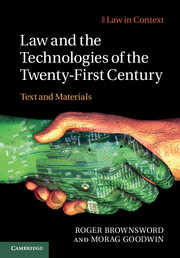Book contents
- Frontmatter
- Contents
- Acknowledgements
- Miscellaneous Frontmatter
- Abbreviations
- Table of cases
- Table of statutes and other public documents
- Part I General introduction
- Part II Regulatory prudence and precaution
- Part III Regulatory legitimacy
- 8 Key boundary-marking concepts
- 9 Human rights as boundary markers
- 10 A look at procedural legitimacy: the role of public participation in technology regulation
- Part IV Regulatory effectiveness
- 11 Regulatory effectiveness I
- 12 Regulatory effectiveness II: failure by regulators
- 13 Regulatory effectiveness III: resistance by regulatees
- 14 Regulatory effectiveness IV: third-party interference and disruptive externalities
- Part V Regulatory connection
- Concluding overview
- Index
- References
14 - Regulatory effectiveness IV: third-party interference and disruptive externalities
from Part IV - Regulatory effectiveness
Published online by Cambridge University Press: 05 August 2012
- Frontmatter
- Contents
- Acknowledgements
- Miscellaneous Frontmatter
- Abbreviations
- Table of cases
- Table of statutes and other public documents
- Part I General introduction
- Part II Regulatory prudence and precaution
- Part III Regulatory legitimacy
- 8 Key boundary-marking concepts
- 9 Human rights as boundary markers
- 10 A look at procedural legitimacy: the role of public participation in technology regulation
- Part IV Regulatory effectiveness
- 11 Regulatory effectiveness I
- 12 Regulatory effectiveness II: failure by regulators
- 13 Regulatory effectiveness III: resistance by regulatees
- 14 Regulatory effectiveness IV: third-party interference and disruptive externalities
- Part V Regulatory connection
- Concluding overview
- Index
- References
Summary
Introduction
Where regulators proceed in an informed and competent way, and where regulatees are disposed to comply, is there any reason to suppose that a regulatory intervention might not be effective? Certainly, other things being equal, we should expect such an intervention to be relatively effective. However, the world does not stand still; things are rarely equal; and the best-laid regulatory plans can be frustrated by third-party interference and by various kinds of crises and catastrophes.
Some kinds of third-party interference are well known – for example, regulatory arbitrage (which is a feature of company law and tax law) is nothing new. Sadly, much the same can be said about natural disasters. Although externalities of this kind continue to play their part in determining the fate of a regulatory intervention, it is the emergence of the internet that has most dramatically highlighted the possibility of interference from third parties. For this reason, in this chapter, we will focus quite extensively on the implications of cyberspace and online technologies for the challenge of regulatory effectiveness.
We will start (in section 2) by identifying the kinds of externalities that can interfere with the success of a regulatory intervention, at er which (in section 3) we will summarise David Johnson and David Post’s famous early assessment of the prospects for regulating activities in cyberspace.
Information
- Type
- Chapter
- Information
- Law and the Technologies of the Twenty-First CenturyText and Materials, pp. 342 - 368Publisher: Cambridge University PressPrint publication year: 2012
